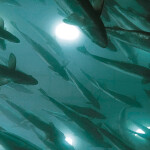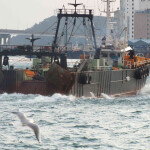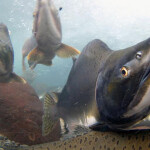The Marine Stewardship Council’s updated fisheries standard includes new requirements for preventing the loss of fishing equipment, such as nets and lines, and more stringent monitoring of the impact of lost gear, also known as “ghost gear.”
In a peer-reviewed paper led by the MSC, a team of scientists including Victor Restrepo, the vice president of the International Seafood Sustainability Foundation, has documented the process the Marine Stewardship Council underwent to revise its policies around gear management for MSC-certified fisheries.
The paper, “The new Marine Stewardship Council requirements to improve ghost gear management: Insights from the policy development process,” published in Marine Policy, is aimed at providing a blueprint for organizations looking to implement more effective management of ghost gear impact. The overall impact of abandoned, lost, or discarded fishing gear (ALDFG) is difficult to estimate, but research based on fisher interviews and fishing effort estimated that 2 percent, or in excess of 78,000 square kilometers of nets, 740,000 kilometers of longlines, and more than 25 million pots and traps, are lost annually.
The MSC Fishery Standard 3.0, which came into effect in May 2023, requires implementation of best practice management strategies that emphasize gear loss preventative measures supplemented by mitigation and remedial action to minimize impact of ghost gear.
Under the new standard, fisheries seeking certification are required to assess the ghost gear impacts of their operations on target stocks and develop modern gear-management procedures.
“MSC stakeholders raised concerns regarding how ghost gear impacts are considered in the fisheries standard. It was argued that the indirect way the issue is handled, principally through non-mandatory guidance to the standard rather than the standard itself, led to inconsistent and ineffective mitigation of ghost gear impacts by fisheries certified to the MSC standard,” the paper found. “Additionally, it was unclear to the MSC whether the standard was incentivizing best practice ghost gear management in MSC fisheries.”
ISSF is a global coalition of seafood companies, fisheries experts, scientific and environmental organizations, and vessel owners promoting science-based solutions in global tuna management. Restrepo said ISSF has found MSC’s new standard “will lever positive on-the-water improvements, improving ocean health and helping to contribute to U.N. Sustainable Development Goals and other global initiatives tackling the ghost gear challenge.”
“The policy development process underpinning the changes to the [MSC] fisheries standard has been a comprehensive undertaking over the last five years,” the paper said. “Every step in the policy development journey helped contribute to the scope, design and intent of MSC’s new ghost gear requirements. The intention of documenting this policy project here is to help others involved in responding to the ghost gear issues.”
Photo courtesy of ISSF







